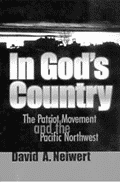THERE’S A WONDERFUL, expression of late 20th-century zeitgeist to be found in David Neiwert’s book about the Northwest’s far-right Patriot movement. The charismatic leader Bo Gritz—founder of the Idaho enclave Almost Heaven, self-proclaimed resistance fighter against the “New World Order,” and the supermacho inspiration for Sylvester Stallone’s Rambo—goes on the radio to talk about . . . his divorce. Gritz confides that he is so upset at being left by his wife that he has been seeing a therapist, who told him that he has a “compulsion to rescue others” because of a “subconscious effort to find and rescue his own father,” a casualty of World War II.
In God’s Country: The Patriot Movement and the Pacific Northwest by David A. Neiwert Washington State University Press, $19.95
This Patriot psychobabble has a comic element, but also a poignant one. Gritz is grasping for something that will pull him out of the abyss, but he does not find it. Three days later, a passerby comes across him lying on the side of the road bleeding after shooting himself in the chest in an unsuccessful suicide attempt.
The twists and turns of Gritz’s life, as Neiwert ably portrays them, add up to quite a story, one that stretches the caricature of the Patriot as a bigoted, trigger-happy loony. Gritz has gone from being the most decorated Green Beret commander in Vietnam to the leader of a three-year attempt to rescue missing POWs to the mediator who talked Randy Weaver out of Ruby Ridge.
In fact, Neiwert, an MSNBC writer-producer, could have written a whole book about Gritz instead of just a chapter. And readers may find themselves wishing that Neiwert had focused on one person or theme instead of relating a mind-boggling array of details, names, and dates in an attempt to capture the entire sweep of a splintered movement. But Neiwert obviously has a deep personal interest in the matter, stemming from an Idaho childhood spent among conservative family members and neighbors who sometimes drifted off toward conspiracy-land. What he has given us is an invaluable, comprehensive reference on one of the Northwest’s strangest exports.
The danger posed by this hodgepodge of subcultures—including militias, the Aryan Nation, and groups with names like the Freemen, Posse Comitatus, and Phineas Priesthood—is a matter of debate that Neiwert does not fully settle. He avoids a stab at a census, though no doubt that’s hard to get from an underground movement. Asserting that it is “widespread though not yet particularly deep,” he instead gives us a picture of little pockets of extremism, usually no more than a few dozen. It often seems that these people are too lost in their own sad lives and paranoid fantasies to take seriously. These are folks who believe that the UN is coming to take their guns away, or that they are citizens of some alternate, biblically based government with the power to print its own money and run its own “common-law” court system. A striking number of them have gone through agonizing divorces or personal upheavals that have left them with nothing. Losers, however, can become terrorists—a point made with explosive clarity in Oklahoma City.
Neiwert has another point to make as well. Rural America is full of disenfranchised people, squeezed by big-money farming and arrogant government bureaucracies, who could become swayed by an ideology that feels their pain. We ignore it at our peril, Neiwert warns, hauling out the obligatory reference to Nazi Germany and going on to call the Patriot movement “a uniquely American kind of fascism.” With this, Neiwert seems to stray into hyperbole himself. There’s no evidence that the rural masses are ready to head into their basements with pipe bomb kits.
Neiwert does persuasively argue, however, that the Patriots pick up on themes of rural (and blue-collar) frustration that go unheard by the urban elite. Neiwert knows this terrain well. He is never better than when describing the treacherous work of crop dusting, the misunderstood practice of jackrabbit clubbing, or the savage carelessness of government workers who built a faulty dam. In his last chapter, he quotes an eloquent rancher who has clashed with Freemen but understands their appeal. “So the Freemen come from a society that has turned its back on its rural roots; where agricultural policy is designed by and for investment bankers, stockbrokers and corporate lawyers. . . . We natives happen to speak English and the toilets flush, but like all colonies, rural America supplies raw materials at a net loss to its inhabitants and to the land.” If Neiwert wants to write another book, he’s got a rich subject right there.








